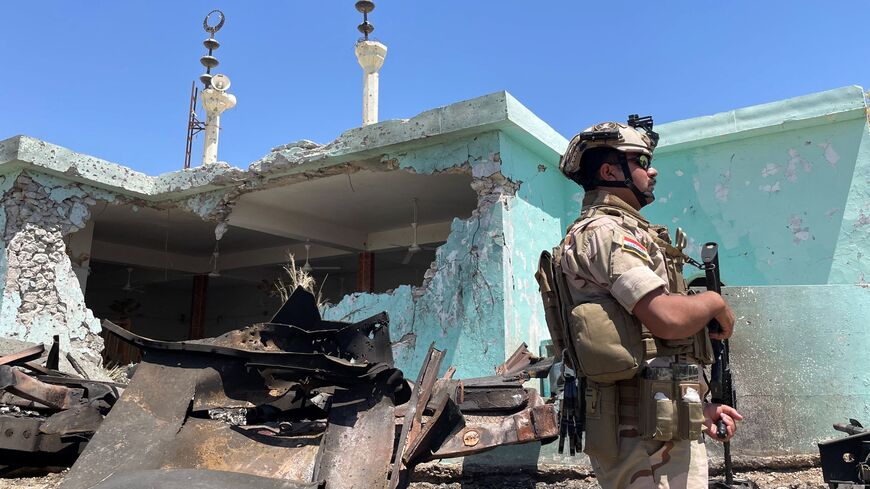BAGHDAD — A new wave of hostility against the US, including threats to attack its facilities in Iraq, has resurfaced recently coinciding with drone attacks on US troops in Syria. A number of factors have prompted this escalation, including Washington's recurring visits and uptick in its diplomatic activity in Baghdad.
With the formation of the new government in Iraq late last year, Iraqi militias' hostility against the United States appeared to be waning. Attacks on the convoys of the US and other coalition members stopped, along with anti-American protests and "death to US" slogans. The regular statements of militia leaders against the US suddenly ended.
It seemed that with the presence of militias’ political wings in the new government, an opportunity for reducing the tension had finally appeared.
In response, US ambassador Alina Romanowski increased embassy activities significantly. During the first five months of the new government, she conducted over 50 meetings with Iraqi officials and attended several public visits in Baghdad and other Iraqi cities.
But hostility against the US, including threats to attack its facilities in Iraq, has resumed in recent weeks. Why is this happening, and will this lead to military attacks against the US interests in Iraq?
Social and political protests
Following an iftar meeting hosted by Iraqi tribal leaders, which Romanowski attended and spoke at, several protests erupted in Baghdad and other southern areas. The meeting was hosted in the traditional tribal guest house of Aal Izreij tribe with its sheikhs and other tribal leaders and representatives of the prime minister's office.
Immediately after the event, Sabereen news, the famous militia Telegram channel, called upon one of the militia-affiliated pressure groups, the Twentieth Revolution Alliance to “clarify their position on this black act.”
The US embassy deleted the photos of tribal sheikhs from the ambassador's Twitter account. The host of the meeting, Saddam Zamel Atwani, also issued a video statement disclaiming responsibility, saying that the event was initiated by the prime minister's office.
He denied that he had invited Romanowski, calling the US the “occupier,” the common term used by the militias.
During the protests that erupted in different parts of Baghdad and other southern areas, the Sadrists, who are taking the opposition side of the government, also exploited the situation to raise anti-government slogans, accusing the government of Prime Minister Mohammed Shia al-Sudani of being under US influence and willing to normalize with Israel.
The militias are clearly worried about the social influence of the US among Iraqi southern tribes, who are mostly Shiite. In the past as well, US social activities in southern Iraq caused strong militia objection and violent reactions. For example, Reham Yacoub, a famous activist from Basra, was assassinated in 2020 for her previous cooperation with the US consulate in the city, which was closed in 2018 after threats by the militias.
The message that the militias are delivering is that the US embassy should not extend its activity into Iraqi society. However, this would significantly reduce US relations with Iraq, and Sudani had expressed his willingness to strengthen economic, educational, cultural and political relations with the US.
Military threats
After months of silence, Ashab al-Kahaf, an identified militia which appeared after the assassination of Qassem Sulaimani, resumed its activity, threatening to bring down US aircrafts in Iraqi skies.
In a video on their Telegram channel, Ashab al-Kahaf threatened to shoot down US Chinook helicopters in Iraq in the upcoming days. Ashab al-Kahaf took responsibility for several attacks on US logistic convoys and military bases during 2020 and 2021. The militia did not set a specific date for the upcoming attack and did not announce the reason for resuming the threat.
In conjunction with that announcement, other militia channels like Sabereen News resumed posting videos of attacking US convoys, which had halted for months.
The militias also are spreading news about unconfirmed attacks on US citizens in Iraq. Last week, Sabereen News announced that a US citizen of Iraqi origin was killed in Baghdad. An unsuccessful attempt to abduct another US citizen was reported last week as well.
The tension seems to be a result of the recent clash between the US and Iran in Syria.
On March 23, an Iraqi militia, Liwa Al-Ghaliboon (The Victorious Brigade), attacked a US military base near Hasakah in northeast Syria, causing one death. On the same day, US forces attacked multiple places, including near the Iraqi border targeting several Iraqi militias.
Furthermore, the recent visits of US military officials to Iraq and Syria also raised the militias' ire. Secretary of Defense Lloyd Austin's announcement from Baghdad last month that US is willing to keep its forces in Iraq drew a strong reaction from the militias, who demanded Sudani end the US presence in Iraq utterly. Also, Chairman of the Joint Chiefs of Staff Mark Milley visited Syria in early March, which the militias considered an attempt to increase US activities in the area.







